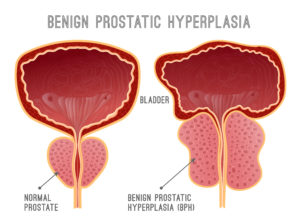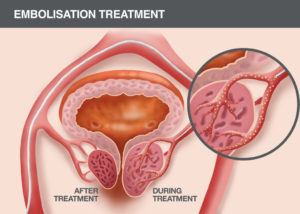As men age, their prostate gland continues to grow. Thus, the gland may eventually exert pressure on the nearby bladder wall and urethra in a condition known as benign prostatic hyperplasia (BPH).
BPH is non-cancerous and easily treated using prostate artery embolization (PAE).

Benign Prostatic Hyperplasia (BPH)
As the enlarged prostate gland continues to grow and cause an increase of internalized pressure, men will, most commonly, experience difficulty urinating.
Otherwise, patients may also experience the following…
● Slowed urination
● Pain while urinating
● Pain after urinating
● Discoloration of the urine
● Urinary incontinence
● And more
Again, BPH is a non-cancerous condition. However, should it be left untreated, it may still cause damage to the patient’s kidneys and urinary tract.
BPH Risk Factors
While all men are at risk of developing BPH by virtue of how the prostate gland functions, some men may be at an increased risk based on their lifestyle and/or medical history.
Specifically, they may face a greater risk of developing BPH if…
● BPH runs in their family
● They are overweight
● They lead a sedentary lifestyle
● They have erectile dysfunction
● Erectile dysfunction runs in the family
● They are 50-years-old or older
● And more
Prostate Artery Embolization (PAE)
A minimally-invasive option for finding long-term relief, prostate artery embolization (PAE) is a leading method for treating men currently living with BPH.
PAE does not require insertion through the penis. Rather, our physician will insert a catheter up a vein in the patient’s groin in order to position it near to the prostate gland itself. Once in place, our physician will release small particles through the catheter that effectively block the flow of blood to the gland.
Once it is deprived of blood, the prostate will shrink, thereby eliminating the patient’s symptoms. Not only can PAE be completed comfortably in our outpatient clinic, but patients can also feel assured knowing…
● PAE features no sexual side-effects
● PAE is a non-surgical procedure
● PAE is approved by the FDA
